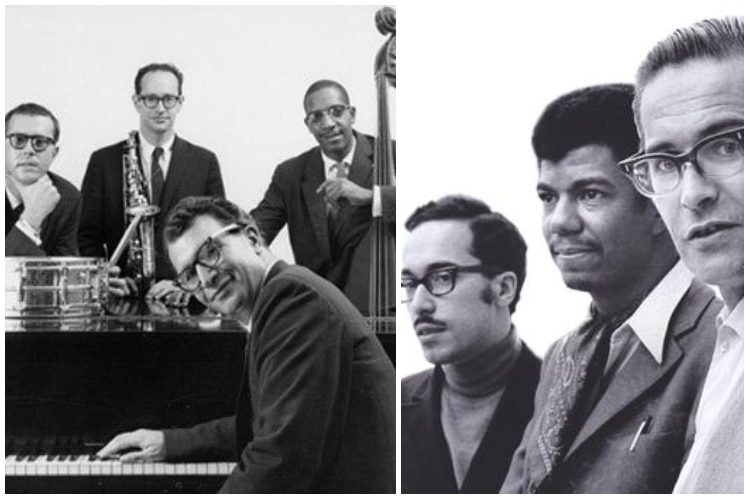|
Getting your Trinity Audio player ready…
|
Dave Brubeck and Bill Evans were the twin Great White Hopes of jazz piano at the apex of the Pax Americana. Born on opposite coasts at the opposite ends of the 1920s, both men achieved great popular success. Brubeck, the elder of the two, became a cult figure on college campuses during the 1950s and famously made the cover of Time magazine at the decade’s midpoint. While Evans got a later start, a high-profile stint in Miles Davis’ pivotal Kind of Blue (Columbia, 1959) sextet slingshotted him to prominence. So, it’s unsurprising that sixty years on, the arrival of new recordings by the two pianists – Brubeck’s Time OutTakes (Brubeck Editions, 2020) and Bill Evans Live at Ronnie Scott’s (Resonance Records, 2020)- qualify as a genuine event.
In Brubeck’s case, the recording in question presents six alternate takes and two new selections from sessions for one of the most iconic and beloved jazz albums of all time. While Time OutTakes doesn’t call for a radical reconsideration of the music, it provides a fascinating look at how this music evolved.
Let’s start with “Take Five,” a tune most serious jazz fans might be grateful never to hear again. The alternate take recorded June 25, six days before the final version is presumably the most presentable–or most instructive–of the 40 from that session that producer Teo Macero was said to have rejected. The first thing you might notice is the initial four-bar melody, which differs from the final version by repeating in the fourth bar the phrase from the third that ends on concert E-flat, rather than on concert B-flat. Paul Desmond’s alto solo is somewhat tentative compared with the gliding lyricism of the buy take. It’s as if he’s trying to work out what to play on an extended modal vamp, a problem Davis worked out with more success on the Kind of Blue sessions several weeks earlier at the same studio. Drummer Joe Morello felt no such hesitation, charging through his drum showcase with flashing Krupa-esque swagger.
“Blue Rondo à la Turk” finds Brubeck stretching out in ten blues choruses that feature occasional “wrong” notes that seem less like mistakes than the pianist dropping-in tricks he learned from his studies with Darius Milhaud. Perhaps emboldened by the leader, Desmond, too, chooses notes far outside the harmony, helping to fashion a cut that is avant-garde in ways beyond the use of the 9/8 Karsilama rhythm.
The alternate take of “Strange Meadowlark” features a solo from Desmond that is jauntier and more playful than the commercially-issued take, despite the latter’s greater polish. Teo chose perfection over inspiration. Similarly, the alternate take of “Cathy’s Waltz,” not only corrects the spelling of the dedicatee’s name but offers more giddy-up and more humor, though of a fashion more dad-joke than sardonic Monkian wit.
The real find here is “I’m in a Dancing Mood,” which didn’t make it onto the original release. That’s puzzling because, with its smooth alternation between 4/4 and waltz-time, this might be the most effective proof of the thesis of “Time Out,” namely that jazz doesn’t have to be in 4/4 to swing. Indeed, this swings harder than anything on the original 1959 issue, thanks to the sturdily walking bass of the undersung Eugene Wright, who died at 97 in December.
Time Out (Columbia, 1959) was the first jazz record to sell a million copies. Discogs.com lists 360 releases in 32 countries in various formats since its initial U.S. release in 1959. Columbia Records has long pursued a strategy of dropping breadcrumbs of newly discovered takes to entice collectors to buy endless repackagings of hit recordings (see, once again, Kind of Blue). So, it’s worth asking why Columbia didn’t long ago send search parties to scour the archives for these tapes, which, apparently, were hidden in plain sight for 60 years.
The extensive press materials assembled for the release are coy about the matter. Discovery of the tapes is credited to “authors [who] had located the audio in Brubeck’s archives” while researching books timed for the centennial of the pianist’s birth last December. Steven Crist, Philip Clark, and Alan Goldsher all released books about Brubeck in the preceding year, and though this writer hasn’t read any of them yet, any mention of the outtakes surely would have been pounced on by the jazz press and maybe the mainstream press, too.
Of course, treasure hunters don’t publish maps. And the fact that the Brubeck family created a label to release Time OutTakes promises more where this came from. That’s good news.
There’s no secret about the treasure hunter behind Bill Evans Live at Ronnie Scott’s (Resonance Records, 2020). Label co-president Zev Feldman is the Indiana Jones of jazz recording archaeologists, and he’s created an industry on exhuming long-forgotten dates by Evans, especially from the summer of 1968. This is Resonance’s third release of recordings made that year, following Some Other Time: The Lost Session From the Black Forest (2016), and Another Time (2018).
It’s not hard to explain Feldman’s Bill Evans obsession. All three releases document the pianist’s short-lived trio with bassist Eddie Gomez and drummer Jack DeJohnette, from whom the latest recordings were sourced.
DeJohnette placed the mic in the piano, near Gomez’s bass and–there’s no way around it–the sound, while accurate enough, can get rough. When the drummer moves to his floor tom or crash cymbal, the recording is violently overdriven. It’s not a huge problem once you adjust your ears, but for a group that made a calling-card of subtle ensemble interaction and coloristic variety, the sonics can’t be waved away, especially when compared with Resonance’s two previous Evans releases from 1968, both of which were professionally recorded.
Those two releases also found Evans in the more relaxed and thoughtful mood one associates with him. Despite—or perhaps because of—Evans’ reportedly contentment during the month-long engagement at the London club (the extensive liners have much to say about this), there are moments on Ronnie Scott’s where the pianist pushes surprisingly hard against the rhythm. Especially when he re-enters after a Gomez solo on uptempo tunes (see “Yesterdays” and “Someday My Prince Will Come”). And Gomez solos a lot. It is impossible not to be awed by his technical facility and invention.
The particulars of DeJohnette’s contribution are not as easily decoded from the recording, but they are easy to feel. With brushes or sticks, he’s an activist at the kit, commenting, prodding, and often dictating the action. Evans had just come off a string of mostly bland drummers before hiring the 25-year old Chicagoan, and it’s clear that DeJohnette brought an energy to the band that clearly inspired Evans, even as it pushed him beyond his comfort zone.
And Evans liked his comfort zone. By 1968, Evans’ setlists centered on a narrow list of favorites. The repertory on this 20-cut set is representative: songbook standards (which are among the most perfunctory performances here), originals (“Quiet Now,” “Waltz for Debby” “Turn Out the Stars” and the inevitable “Nardis”) and Evans specialties. The latter category produces the most rewards. From the jaunty opener, “A Sleeping Bee,” the two affectionate treatments of Johnny Mandel’s “Emily” and a searching “Alfie,” Evans’ fondness for this material feels fresh and genuine. If he played the other stuff because it was what Londoners wanted to hear, he played these songs because they were what he wanted to hear.
If you want to hear them, more thoughtful performances with better sound on the other two Resonance releases, as well as on the Grammy-winning Bill Evans at the Montreux Jazz Festival (Verve, 1968). Like the record said, everybody loves Bill Evans, but Bill Evans Live at Ronnie Scott’s just might be proof that it is possible to have too much of a good thing.
Time OutTakes is available now on CD, digital, and streaming services.
Tracklist (Time OutTakes): 1. Blue Rondo a la Turk; 2. Strange Meadowlark; 3. Take Five; 4. Three To Get Ready; 5. Cathy’s Waltz; 6. I’m In A Dancing Mood; 7. Watusi Jam; 8. Band Banter from the 1959 Recording Sessions.
Personnel: Dave Brubeck (piano), Paul Desmond (alto saxophone), Eugene Wright (bass), Joe Morello (drums).
Bill Evans Live at Ronnie Scott’s is available now on two LPs and two CDs.
Tracklist (Bill Evans Live at Ronnie Scott’s): 1. A Sleepin’ Bee; 2. You’re Gonna Hear From Me; 3. Yesterdays; 4. Turn Out the Stars 5. My Man’s Gone Now; 6. Emily; 7. Spring Is Here; 8. Embraceable You; 9. For Heaven’s Sake; 10. Someday My Prince Will Come; 11. Quiet Now; 12. ‘Round Midnight; 13. Stella By Starlight; 14. Alfie; 15. You’re Gonna Hear From Me; 16. Very Early; 17. Emily; 18. Waltz for Debby; 19. Autumn Leaves; 20. Nardis.
Personnel: Bill Evans (piano), Eddie Gomez (bass), Jack DeJohnette (drums).







Leave a Reply